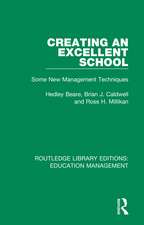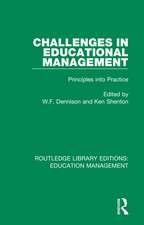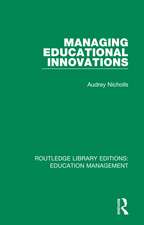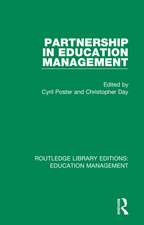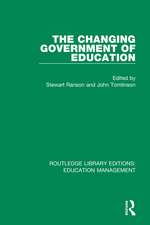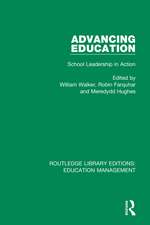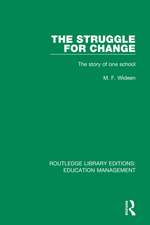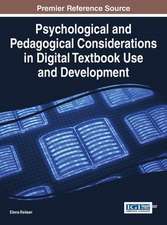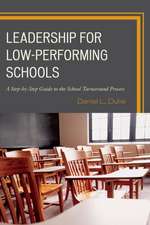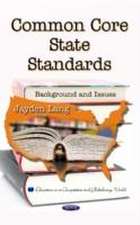Applying Turbulence Theory to Educational Leadership in Challenging Times: A Case-Based Approach
Autor Steven Jay Grossen Limba Engleză Paperback – 8 oct 2019
| Toate formatele și edițiile | Preț | Express |
|---|---|---|
| Paperback (1) | 368.81 lei 6-8 săpt. | |
| Taylor & Francis – 8 oct 2019 | 368.81 lei 6-8 săpt. | |
| Hardback (1) | 1072.02 lei 6-8 săpt. | |
| Taylor & Francis – 7 oct 2019 | 1072.02 lei 6-8 săpt. |
Preț: 368.81 lei
Nou
Puncte Express: 553
Preț estimativ în valută:
70.57€ • 73.95$ • 58.34£
70.57€ • 73.95$ • 58.34£
Carte tipărită la comandă
Livrare economică 11-25 aprilie
Preluare comenzi: 021 569.72.76
Specificații
ISBN-13: 9781138046726
ISBN-10: 1138046728
Pagini: 204
Ilustrații: 2
Dimensiuni: 152 x 229 x 15 mm
Greutate: 0.28 kg
Ediția:1
Editura: Taylor & Francis
Colecția Routledge
Locul publicării:Oxford, United Kingdom
ISBN-10: 1138046728
Pagini: 204
Ilustrații: 2
Dimensiuni: 152 x 229 x 15 mm
Greutate: 0.28 kg
Ediția:1
Editura: Taylor & Francis
Colecția Routledge
Locul publicării:Oxford, United Kingdom
Cuprins
Preface
Part 1: Understanding and Applying Turbulence Theory
Chapter 1: Orienting yourself for the journey into a turbulent educational landscape
Chapter 2: Examining Turbulence Theory
Chapter 3: Applying Turbulence Theory to respond effectively to critical incidents.
Part 2: Putting Turbulence Theory to Work: The Cases
Chapter 4: Central Office Administrators: Encouraging Local Initiative versus Control
Chapter 5: Principals: Democratic Ethical Leadership versus Behaviors of Conventional School Leaders
Chapter 6: Teachers: Individual Agency versus Conformity
Chapter 7: Students: Equity versus a Narrow Equality
Chapter 8: Families and Communities: Citizenship versus Consumerism
Part 3: Conclusion
Chapter 9: Next Steps in Our Journey of Understanding and Applying Turbulence Theory
About the Contributors
Index
Part 1: Understanding and Applying Turbulence Theory
Chapter 1: Orienting yourself for the journey into a turbulent educational landscape
Chapter 2: Examining Turbulence Theory
Chapter 3: Applying Turbulence Theory to respond effectively to critical incidents.
Part 2: Putting Turbulence Theory to Work: The Cases
Chapter 4: Central Office Administrators: Encouraging Local Initiative versus Control
Chapter 5: Principals: Democratic Ethical Leadership versus Behaviors of Conventional School Leaders
Chapter 6: Teachers: Individual Agency versus Conformity
Chapter 7: Students: Equity versus a Narrow Equality
Chapter 8: Families and Communities: Citizenship versus Consumerism
Part 3: Conclusion
Chapter 9: Next Steps in Our Journey of Understanding and Applying Turbulence Theory
About the Contributors
Index
Notă biografică
Steven Jay Gross is Founding Director of the New DEEL (Democratic Ethical Educational Leadership) Community Network and Professor Emeritus of Educational Leadership at Temple University, Philadelphia, PA.
Recenzii
"Applying Turbulence Theory to Educational Leadership in Challenging Times: A Case-Based Approach is the perfect book for this time in which we live in the field of school leadership. It is a great resource for today's school leaders to have in their leadership tool belt. Turbulent times call for a resource that provides clear approaches and options that help make sense in the midst of chaos, uneasiness, and uncertainty in the schools of the 21st century."
Judy A. Alston, Professor, Department Doctoral Studies and Advanced Programs, Dwight Schar College of Education, Ashland University
"This book is most valuable in putting Gross' 'turbulence theory’ to work by offering exciting and cutting-edge ways to think deeply about how to empower students to re-conceptualise consumerism and narrow conceptualisations of equality for social mobility. The book offers case studies with international reach and coherence on co-creating liberating scaffolds for social freedom and justice in classrooms, schools and education systems. Never have we more needed a book such as ‘Applying Turbulence Theory to Educational Leadership in Challenging Times: A Case-Based Approach’."
Alison Taysum, Senior Fellow of the Higher Education Academy, Programme Leader MSc Educational Leadership, PhD and EdD Supervisor, School of Education, University of Leicester, UK
"Along with a myriad of scholar practitioners Steve Gross has done it again! In the purest expression of school leadership imaginable, Applying Turbulence Theory to Educational Leadership in Challenging Times: A Case-Based Approach, explores the crux of where real people, in real communities, solve real problems for the benefit of their communities and the students they serve. This book is a must read for all concerned about the current state of the world we live in, and who have a vested interest to work with the turbulent energy that constantly surrounds us all. Reading this book has been eye opening and has energized me to act in ways I never thought possible."
Anthony Normore, Professor Emeritus, California State University Dominguez Hills.
"Applying Turbulence Theory to Educational Administration in Challenging Times: A Case-Based Approachis an invaluable resource for educational leaders at all levels striving to effect positive change within their school communities. Dr. Gross thoroughly captures the essence of both existing and potential turbulence in contemporary education systems while juxtaposing these against historical events that, at the time, felt similarly insurmountable. The case studies, prefaced by Dr. Gross’ clearly articulated Turbulence Theory and step-by-step application framework, provide educational leaders a timely, practical tool for assessing and making ethical decisions about themselves, their school communities, and the greater purpose of education in challenging times."
Hollie Mackey, Associate Professor of Educational Leadership, North Dakota State University
"The concept of Turbulence provides an important and useful lens to understand the possibilities for educational change. We must disrupt the system for change to occur—but not so much that chaos makes a path forward impossible."
Dana Mitra, Professor of Education, Department of Education Policy Studies, Penn State University
"The very idea of blending turbulence theory with school leadership places the realities of administration in a place of both unease and understanding. Contextualizing change that school leaders must engage in one or several of the four levels of turbulence, Gross offers the educational leader a rare opportunity to comprehend and to openly demonstrate some level of trepidation where the whole notion of programmatic or institutional change and transition is concerned. Turbulence theory allows those who are initiating change as well as those within educational settings, that are impacted by transitions, to operate in a setting that openly engages with such themes as security, economics technology and environment as a way to both understand and respond to the processes of change or institutional turbulence.
Gross has done an excellent job in causing the reader to come to grips with what he calls the drivers of turbulence. Those being, positionality, cascading and stability. Finally, the five critical qualities of turbulence: patterns of turbulence, out of the blue turbulence, turbulence as a movie, development of turbulence and turbulence as a constructive force help the reader to become, if not welcoming, at a minimum, more knowledgeable about the inevitability and the nature of transition taking place in any educational setting. This is a must read especially for educational leaders."
Michael E. Dantley, Dean, College of Education, Health and Society, Professor, Educational Leadership, Miami University
"Applying Turbulence Theory to Educational Leadership in Challenging Times is a deeply thoughtful work. In this book, Steve Gross provides an original framework, rooted in experience, to help leadership practitioners in education understand and respond to the many challenges they face. Steve addresses the leader or would-be leader directly in a tone that displays the care that he has for the craft of leadership and for the people who are called to exercise that craft. His writing conveys a rich sense of history and a commitment to the practical value of theory, as well as an understanding of what it means to be a leader who has to work through the squalls and storms, as well as the quieter times of stability, that affect day-to-day education practice. The book is a compelling read because Steve makes the theory of turbulence live through meaningful and authentic cases of practice. These cases are rich sources of learning for the reader about leadership in education."
Philip Woods, Professor of Educational Policy, Democracy and Leadership, Director of the Centre for Educational Leadership, University of Hertfordshire, UK
Judy A. Alston, Professor, Department Doctoral Studies and Advanced Programs, Dwight Schar College of Education, Ashland University
"This book is most valuable in putting Gross' 'turbulence theory’ to work by offering exciting and cutting-edge ways to think deeply about how to empower students to re-conceptualise consumerism and narrow conceptualisations of equality for social mobility. The book offers case studies with international reach and coherence on co-creating liberating scaffolds for social freedom and justice in classrooms, schools and education systems. Never have we more needed a book such as ‘Applying Turbulence Theory to Educational Leadership in Challenging Times: A Case-Based Approach’."
Alison Taysum, Senior Fellow of the Higher Education Academy, Programme Leader MSc Educational Leadership, PhD and EdD Supervisor, School of Education, University of Leicester, UK
"Along with a myriad of scholar practitioners Steve Gross has done it again! In the purest expression of school leadership imaginable, Applying Turbulence Theory to Educational Leadership in Challenging Times: A Case-Based Approach, explores the crux of where real people, in real communities, solve real problems for the benefit of their communities and the students they serve. This book is a must read for all concerned about the current state of the world we live in, and who have a vested interest to work with the turbulent energy that constantly surrounds us all. Reading this book has been eye opening and has energized me to act in ways I never thought possible."
Anthony Normore, Professor Emeritus, California State University Dominguez Hills.
"Applying Turbulence Theory to Educational Administration in Challenging Times: A Case-Based Approachis an invaluable resource for educational leaders at all levels striving to effect positive change within their school communities. Dr. Gross thoroughly captures the essence of both existing and potential turbulence in contemporary education systems while juxtaposing these against historical events that, at the time, felt similarly insurmountable. The case studies, prefaced by Dr. Gross’ clearly articulated Turbulence Theory and step-by-step application framework, provide educational leaders a timely, practical tool for assessing and making ethical decisions about themselves, their school communities, and the greater purpose of education in challenging times."
Hollie Mackey, Associate Professor of Educational Leadership, North Dakota State University
"The concept of Turbulence provides an important and useful lens to understand the possibilities for educational change. We must disrupt the system for change to occur—but not so much that chaos makes a path forward impossible."
Dana Mitra, Professor of Education, Department of Education Policy Studies, Penn State University
"The very idea of blending turbulence theory with school leadership places the realities of administration in a place of both unease and understanding. Contextualizing change that school leaders must engage in one or several of the four levels of turbulence, Gross offers the educational leader a rare opportunity to comprehend and to openly demonstrate some level of trepidation where the whole notion of programmatic or institutional change and transition is concerned. Turbulence theory allows those who are initiating change as well as those within educational settings, that are impacted by transitions, to operate in a setting that openly engages with such themes as security, economics technology and environment as a way to both understand and respond to the processes of change or institutional turbulence.
Gross has done an excellent job in causing the reader to come to grips with what he calls the drivers of turbulence. Those being, positionality, cascading and stability. Finally, the five critical qualities of turbulence: patterns of turbulence, out of the blue turbulence, turbulence as a movie, development of turbulence and turbulence as a constructive force help the reader to become, if not welcoming, at a minimum, more knowledgeable about the inevitability and the nature of transition taking place in any educational setting. This is a must read especially for educational leaders."
Michael E. Dantley, Dean, College of Education, Health and Society, Professor, Educational Leadership, Miami University
"Applying Turbulence Theory to Educational Leadership in Challenging Times is a deeply thoughtful work. In this book, Steve Gross provides an original framework, rooted in experience, to help leadership practitioners in education understand and respond to the many challenges they face. Steve addresses the leader or would-be leader directly in a tone that displays the care that he has for the craft of leadership and for the people who are called to exercise that craft. His writing conveys a rich sense of history and a commitment to the practical value of theory, as well as an understanding of what it means to be a leader who has to work through the squalls and storms, as well as the quieter times of stability, that affect day-to-day education practice. The book is a compelling read because Steve makes the theory of turbulence live through meaningful and authentic cases of practice. These cases are rich sources of learning for the reader about leadership in education."
Philip Woods, Professor of Educational Policy, Democracy and Leadership, Director of the Centre for Educational Leadership, University of Hertfordshire, UK
Descriere
Reframing how to understand the drivers of turbulence, Applying Turbulence Theory to Educational Leadership in Challenging Times provides aspiring and practicing educational leaders with the theory and tools for understanding Turbulence Theory and its application to school contexts.

